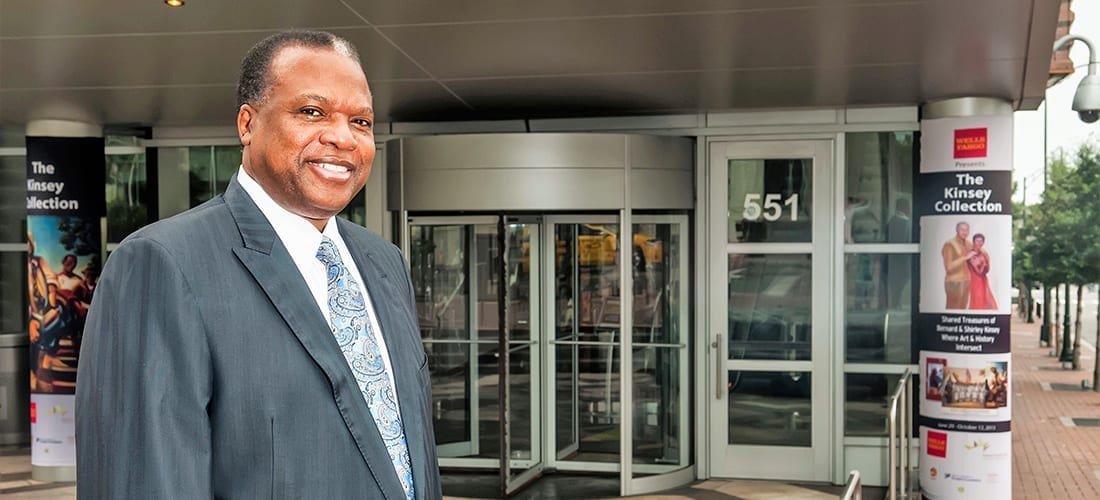Part of the solution
August 2, 2020

Gantt Center President and CEO David Taylor discusses initiatives surrounding equity and social justice as Charlotte and the nation chart turbulent waters.
by Michael J. Solender
Mary T. Harper and Bertha Maxwell Roddey co-founded Charlotte’s Afro-American Cultural Center in 1974 to serve as a beacon to celebrate the Black experience. Nearly five decades later, what’s now the Harvey B. Gantt Center for African American Arts + Culture is more than living up to that vision.
Today’s Gantt Center is the city’s most prominent Black-led nonprofit organization and one of the region’s most significant arts and cultural institutions. President and CEO David Taylor has led the Gantt since 2009, sharpening the institution’s focus and directing programming to move our community from conversation to change regarding some of the most pressing social-justice challenges.
During the summer of 2018 after the shooting of Keith Lamont Scott, Taylor implemented the Initiative for Equity + Innovation. The strategy uses the Gantt’s exhibitions, programs and community relationships to better inform and engage Charlotteans about social injustices Black communities face and systems in need of reform.
SouthPark spoke with Taylor about this initiative, the center’s’ Unmasked online discussion series, and what the community can expect when the center reopens.
Comments have been edited for length and clarity.
What is the context behind the Gantt’s Initiative for Equity + Innovation, and how does it resonate in the current climate?
The Gantt Center made the intentional decision to say, “What can we do in terms of working with our community to be a resource to address issues like bias, inequities and social justice?” We knew it wasn’t going to be solved over a short period of time. We felt our institution gives the community a way to begin to address some of those issues. It’s part of our DNA. We needed to build it programmatically and more effectively. In the current climate, With [George Floyd’s] unfortunate murder, it’s beginning to shine light back on so many things we feel are important to be talking about and acting upon.
You speak of art as activism, what does that mean at
the Gantt?
Our founders and the students at UNC Charlotte, through the unrest and changes taking place, felt they needed a place where they could promote their culture, preserve their culture and nurture the next generation. [Former Charlotte Mayor and architect] Harvey Gantt has a legacy of affecting change through social justice and equality. We think continuing to [respond] to what’s relevant today is key. That’s what is activism. The heart of activism came about as an example of us looking at the great creators that we have in our community. How can we take the messaging in their artwork and use it to activate change, conversation to engage work affecting behavioral change? We’ve been extremely fortunate to do that.
How did the Unmasked series come about?
We began to have conversations about important and relevant topics in the community. [At the onset of] COVID-19, we had to rethink how we would deliver our work and what would be important to talk about. For us, one clear metaphor is found with wearing a mask. But the virus itself shed light on disparities that take place in our community. It made it so bright, suddenly you could see it. You could see where health care was and where it wasn’t. You could see how the impact of years and years of poor health care were extracting certain segments. Unmasked is about shedding the light on these things. Let’s take the mask off disparities: Let’s take the mask off health care disparities, education disparities, policing and those things. That’s what led us in that direction of using our platform to inform the community, but also help find solutions.
Are you reaching a diverse audience?
This platform is meant to be a safe space [for difficult conversations]. It’s allowed more culturally diverse people to come, listen and contribute. All backgrounds recognize [these issues] affect our entire community. Sometimes discussions may be focused on the health and welfare of the Black community specifically, but without everybody being able to participate, we won’t ever have the kind of community we all want.
What can the community expect when the Gantt reopens?
We’ll have a new exhibition with 25 artists representing 17 countries throughout the Caribbean. It’s so timely, addressing these issues about equity and police brutality. All these things are captured. We are also working with local artists including [Charlotte photographer] Alvin C. Jacobs Jr. who is leading a team for an installation around the Black Lives Matter [movement]. We are including many of the artists who did the mural on Tryon Street.
We look forward to welcoming back the community. We are a place where people can come to learn and better understand themselves, as well as their fellow man. SP




